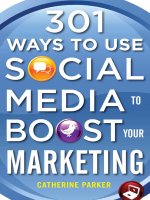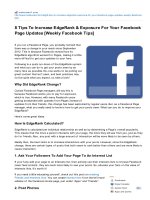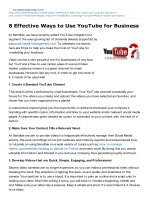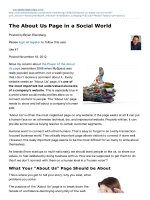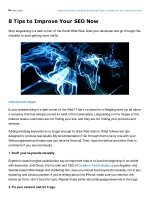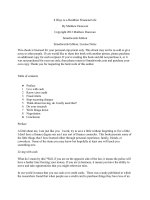8 ways to improve your about us page
Bạn đang xem bản rút gọn của tài liệu. Xem và tải ngay bản đầy đủ của tài liệu tại đây (86.44 KB, 4 trang )
inc.com
/>your-about-us-page.html?cid=em01013week41
8 Ways to Improve Your 'About Us' Page
Chances are, it's one of the most-visited pages on your site. It's probably also the weakest. Here's
how to fix it.
shutterstock images
Which page of your website gets the most visitors? If you're like most businesses, your About Us
page is at or near the top of the list.
That's great unless you treat your About Us page as an afterthought.
After your site gets potential customers interested in your products or services, they naturally
head to your About Us page often within three to four clicks to make sure your company is the
right choice to provide those products and services. That's why your About Us page is often your
website's make or break page.
Of course writing about yourself and your business is awkward, so many About Us pages read
something like this:
"NextBigThing Technologies is a global solutions provider that redefines enterprise networking and
connectivity by providing a unique blend of innovative world-class services and outstanding
customer experiences."
Sounds impressive, especially if you like buzzwords. But it says nothing.
So take a different approach. Make sure your About Us page gives potential customers what they
need to feel comfortable choosing you:
Start wit h the cust omer's needs.
Forget what you do. Customers don't care about what you do; they care about what they receive:
solutions and benefits.
So what do potential customers want to know? At a basic level, first-time visitors want to know
you own a real business with real capabilities. What questions do customers typically ask during
sales calls? What information tends to seal a deal or win over a hesitant customer?
If I want to outsource product fulfillment, "providers of outstanding customer experiences" means
nothing to me, but "99.7% on-time shipping with a .0021% error rate for the past five years" means
a lot because it means you care about, measure, and deliver a service critical to my business.
Think f act s, not superlatives.
Many About Us pages are filled with words like visionary, outstanding, disruptive, excellent, world-
class, cutting edge
If your business really is outstanding, give me facts: I'll decide if you're outstanding. If your business
really is visionary, tell me about cool products you've developed: I'll decide if they're visionary.
And if you're a new business and don't have facts and figures, don't make them up. Describe what
your business hopes to achieve and how you plan to achieve it. Give me the chance to decide if I
want to jump on board with you.
Never try to be something you're not .
Check out a few About Us pages: Generally speaking, the smaller the business the "fluffier" the
content .
Fluff is boring. Candor is compelling. Be who you really are and make that your advant age.
If you're a start-up, own it. If you're bootstrapping, own it. Start-ups are cool, and so is
bootstrapping. Describe how new clients will benef it from the fact you're new or small: You can put
more focus on individual customers, you can provide shorter lead times, you'll take relatively small
orders so you can prove yourself in a new market, etc.
Speaking of being who you are
Use real phot os.
Always use photos of real people and places. If you can't, don't use any photos.
And don't let your Web folks convince you to use stock photos in order to add visual appeal to the
page. We're all experts at spotting stock phot os.
The pretty boy wearing an ill-fitting hard hat and pret ending to read blueprints doesn't add visual
appeal. He just looks silly.
Streamline your accolades.
Certifications are important, except when they're not.
If I want to build a sustainable facility, finding an engineer with LEED accreditation may be
important. If I want a wedding photographer, finding one who is a member of the Wedding
Photojournalist Association may not be so important, especially since the accept ance
requirements are easy to meet.
Awards can also add credibility, but pick the few that make the most impact on potential
cust omers. (If you can't stand the thought of leaving any awards out, create a separate "Industry
Awards" page and get all crazy with your self-congratulat ory self.)
So if you won a Tony award, it's probably okay to leave out your "Best Ensemble Dancer in a
Comedy or Drama at Curly Joe's Dinner Theater and Swap Shop" award.
Never st op tweaking.
A great About Us page should be a work in progress. Whenever you land major customers, add
expertise and capabilities, enter new markets, open new locations, etc., update your About Us
page right away.
Make sure your About Us page always matches what you would say if I asked you about your
company today.
Play pop quiz.
Ask people who know little or nothing about your business to read your About Us page and then
describe what you do. If they can't answer most of the five Ws (who, what, when, where, why), get
back to work.
By the way, that's a perfect task for all those social media connections you have but never
actually seem to connect with. Asking for input is a great reason to reach out, and most people will
be flattered by the fact you want their opinion.
Finally, get over yourself.
If you're fairly modest, writing your About Us page feels salesy and self-congratulatory, so you
stop short of describing your business accurately. If you aren't particularly modest, writing your
About Us page is really fun, so you go way over the top.
Either way, get over yourself. The end result is too important. Fortunately it's easy: Just focus on
facts, figures, and accomplishments. Objective information is a lot easier to write.
It's more powerful, too. Simply think about the needs you fulfill and the problems you solve for
your customers.
Then use plain language to describe how you fulfill those needs and solve those problems. Use
plain language to describe who you really are.
That's the best way to establish credibility and help potential customers decide you're the best
choice because ultimately people do business with real people, not with companies.
Jeff Haden learned much of what he knows about business and technology as he
worked his way up in the manufacturing indust ry. Everything else he picks up from
ghostwriting books for some of the smartest leaders he knows in
business. @jeff_haden
